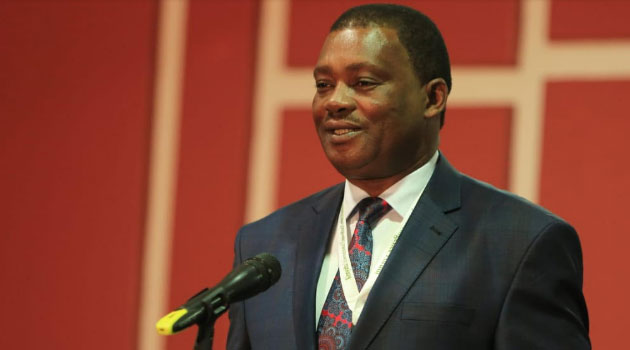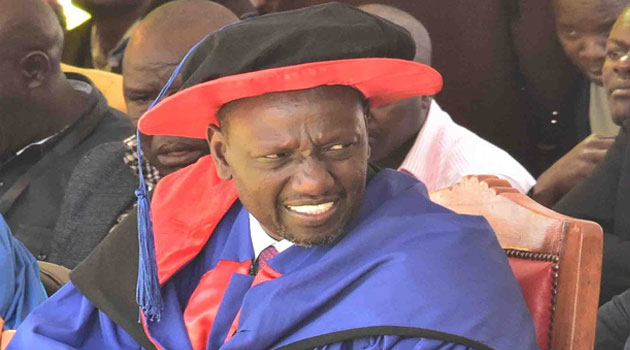NAIROBI, Kenya, Mar 12 – Deputy President William Ruto Thursday told off a section of lawmakers calling for his immediate resignation for what they termed as incessant accusations that amounted to undermining the institution of the presidency in which he serves as the second in command.
Responding to a statement issued Wednesday by Members of Parliament pledging allegiance to President Uhuru Kenyatta and former Prime Minister Raila Odinga, Ruto termed accusations against him as baseless and nonsensical.
“Ninety-nine per cent of MPs pretending to give me lectures on supporting Uhuru Kenyatta have NEVER voted for him. I have CAMPAIGNED, VOTED and SUPPORTED him in the 4 elections he ran for president,” he tweeted.
He added similar opposition was voiced against his joint presidential candidature with President Uhuru Kenyatta in 2013 and 2017.
“The NOT new nonsensical insults/ sterile accusations spewed were against UHURUTO/Jubilee in the past. IGNORE,” Ruto remarked.
Wednesday’s statement by about 70 legislators commandeered by Kieni legislator Kanini Kega spiraled tension between pro-Ruto politicians and those rallying behind Odinga who is leading a charge for a constitutional amendment under the Building Bridges Initiative (BBI).
On Tuesday, Ruto’s Legal Advisor, Korir Sing’Oei, dismissed calls for the adoption of a party-list proportional representation system to replace popular presidential polls under the current constitutional dispensation.
The proposal presented by National Assembly Speaker Justin Muturi to the BBI steering committee would see the party or coalition of parties garnering most votes in a general election name the President and his deputy as is the case in South Africa.
“In order to build a bridge that allows us to transcend the pitfalls of heavily contested presidential elections, it is proposed to remove election of President by universal suffrage,” Muturui submitted arguing, “instead, the popular will of the people manifested through one man one vote should be actuated through the nomination of President by the Party that garners majority votes at the general election.”
Ruto’s aide termed the proposed change untenable given the ethnic orientation of political parties and their nondemocratic tendencies.
“Given the personalization of our political parties and their disgraceful ethnic orientation Speaker JBMuturi proposals to BBI are disturbing and disingenuous. Managing political competition doesn’t need to pander to the absurd,” Sing’Oei remarked.

The new clamour for an end to presidential elections by universal suffrage is seen as a threat to Ruto’s 2022 ambitions given the now deep-rooted factionalism within the governing Jubilee Party through which he hopes to contest for the top political seat.
READ: Muturi proposes scrapping of popular presidential vote, roots for party-based polls
The situation is compounded the uncertainty surrounding party elections that had been slotted for March 31 amid mixed signals on whether Kenyatta will relinquish interim party leadership to his deputy, Ruto, who currently serves as deputy party leader and presumably the most popular candidate for the party leadership.
Former Jubilee Party Interim Vice Chairperson David Murathe has repeatedly insinuated President Kenyatta will not hand over to Ruto.
Murathe resigned in January 2019 citing irreconcilable differences with Ruto with whom he said he cannot seat in the party’s top organ, the National Executive Council.
Should Muturi’s proposal be framed as a referendum question, divisions within Jubilee Party are likely to escalate as factions battle to control ruling party which until 2017 was a coalition of parties bringing together Kenyatta The National Alliance, Ruto’s United Republican Party and other smaller parties including Tourism Cabinet Secretary Najib Balala’s Republican Congress.
The recalibration of the electoral system to one akin to South Africa’s could significantly change the 2022 game plan, at worse breaking Jubilee Party into two formations opening the possibility of alliances with other political outfits.
While Ruto has asserted he will support whoever the party names as its candidate for the 2022 presidential elections, a change in the rules of engagement could see him elbowed out of the contest to succeed Kenyatta.
How does party-list proportional representation system work?
In South Africa, the Electoral Commission divides the number of valid votes cast by the number of available seats (400) in Parliament to determine the number of votes a party needs for a single seat.
In 2014 for instance, a party needed 45,000 votes for a single seat in the House.
An extra seat is added to a party with the highest number of leftover votes after diving the votes it garnered by the set quota.
The governing African National Congress (ANC) for instance bagged 230 seats in the National Assembly in 2019 making the post-apartheid formation the party with the largest number of lawmakers in the 400-member Assembly followed by the Democratic Alliance (DA), and the Economic Freedom Fighters (EFF) with 84, and 44 members respectively.
ANC has also single-handedly elected South African presidents beginning with Nelson Mandela in 1994 after the party won 63 per cent of the votes in that year’s election, Thabo Mbeki (1997 – 2007), Jacob Zuma (2007 – 2017) and presently Cyril Ramaphosa.















































